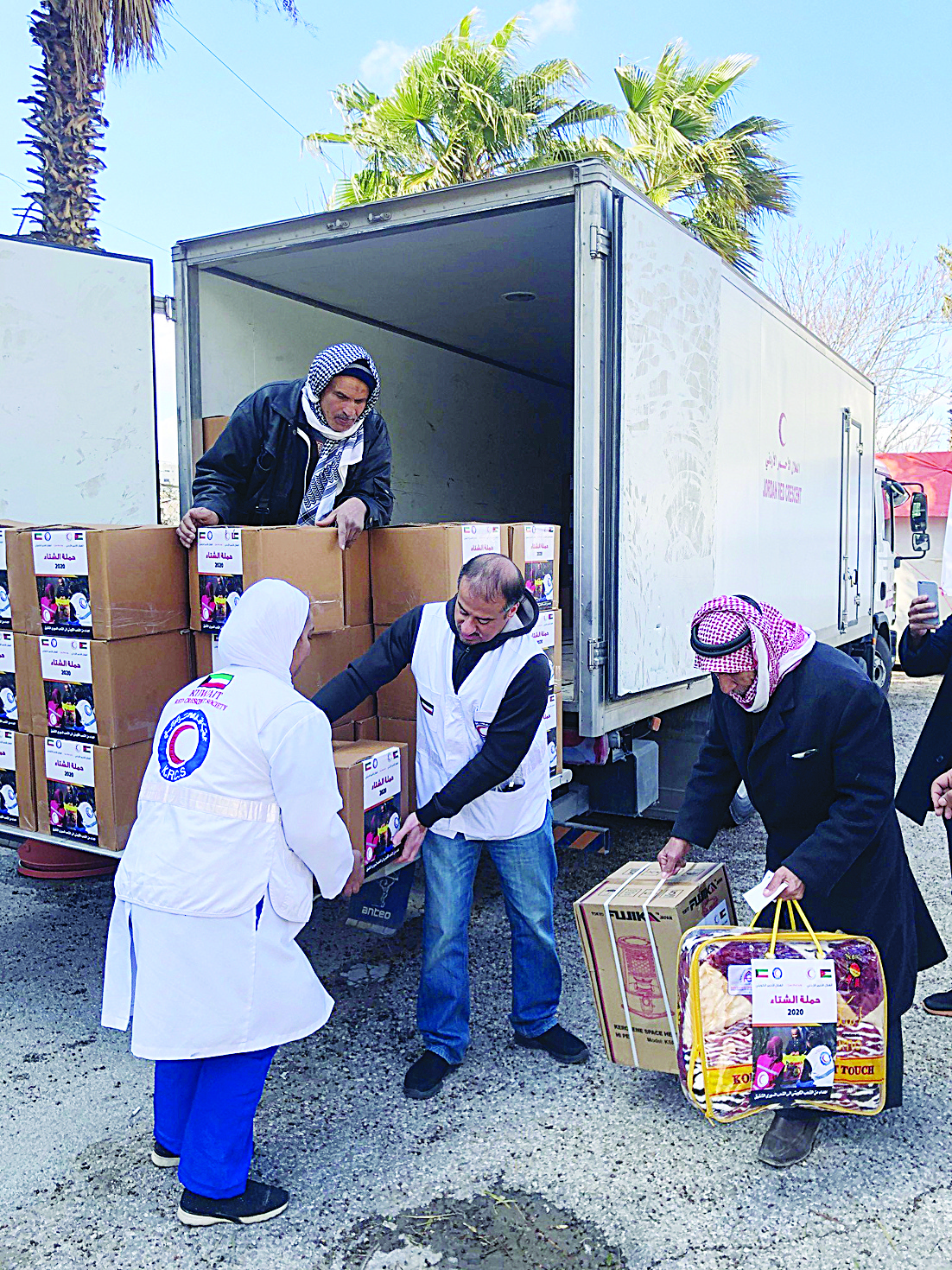
KUWAIT: National philanthropic associations, namely Kuwait Red Crescent Society (KRCS), have pursued humanitarian activities abroad but some attention has been shifted to aiding cash-strapped families in Kuwait. Heeding His Highness the Amir Sheikh Sabah Al-Ahmad Al-Jaber Al-Sabah's guidelines, more philanthropic tasks were performed last week, coinciding with the State of Kuwait national days' celebrations. Kuwait Red Cross Society (KRCS), one of the top national relief organizations, has turned attention to the domestic level, intensifying efforts to help children of low income families, the handicapped, the sick and the widows.
"Our delight with the national celebrations is unlimited," said Maha Al-Barjas, the KRCS Secretary General, in a press statement after distributing various kinds of assistance to poor families at Al-Shaheed Park, marking the National Day and the Liberation Day. Each year, number of families participating in the national celebrations increases, she has said, affirming that the society will continue to help these families with various programs.
In line with the State of Kuwait's "Al-fazaa" (an Arabic old term for mobilization) to relieve stricken Syrian families in winter, President of the International Islamic Charity and Amiri Diwan Advisor Dr Abdullah Al-Maatouq called for donations to help relocated Syrians in North Syria and refugees in Lebanon. Dr Maatouq, also special advisor of the UN Secretary General, said Syrians displaced from beleaguered region of Idlib, Northwest Syria, are experiencing "a horrific humanitarian tragedy," noting their urgent need for food, drinking water, medicines, milk for children, blankets, tents and heating utensils.
Some of these hungry families have been wandering astray in uninhabited areas, looking for shelter and food amid snowfalls and biting cold. The charity is pursuing its winter campaign, dubbed "their life under zero," designed to secure the relocated Syrians' needs, such as erecting a makeshift town, named "life town," to house 1,800 Syrian families, at a cost of KD 333 ($1,000) per residential unit. Moreover, it delivered aid for Syrian refugees in the Lebanese border town of Ersal.
The International Islamic Charity has recently sheltered 600 Syrian families from Hama countryside in cement units, delivered meals to 6,900 families, one million gloves of bread, one million liters of clean water, 1,000 food parcels, 100 heaters, 500 heating fuel rations and 3,000 boxes of children milk. Shedding further light on hardships of the displaced in northern Syria and the refugees in the Lebanese Bekaa valley, Dr Maatouq said snow and rain caused power outage, formed ponds of mud and fily on the camps' alleys making refugees' movement and transfer quite difficult.
In Jordan, the KRCS was active again, executing a relief program for aiding 500 Syrian refugee families. The program is part of a campaign, launched last week, to provide food and medical aid. A team of Kuwaiti doctors and surgeons conducted operations for 50 cases. Dr Hilal Al-Sayer, the KRCS president, said the latest society activity in Jordan was intended to provide clothes to Syrian families. he added that the medical team would conduct other surgeries to treat illnesses in various patients' organs at a rate of 45 operation in three days.
Elaborating, Dr Sayer has indicated that the Kuwaiti Red Crescent is expanding its relief medical program globally, reaching the sick among refugees and the needy in Bangladesh, Afghanistan, Gaza, Yemen, Iraq, Sri Lanka, in addition to those in Lebanon, Jordan and Turkey. At the local level, it will pursue philanthropic tasks in Kuwait, with support from the political leadership, Dr Sayer has re-affirmed.
Dr Abulatif Al-Turki, a consultative doctor of kidney and urinary tract surgery at the Amiri Hospital, said the Kuwaiti medical team succeeded in conducting a large number of surgeries and operations in a record short time, treating patients of chronic and physical abnormality cases. Meanwhile, KRCS board member Dr Khaled Al-Sebeeh has said the society launches throughout the year programs and campaigns to enhance the public health awareness, latest of which was issuance of guidelines on protection against the novel coronavirus (COVID-19).
Kuwaiti Ambassador Aziz Al-Daihani, who inspected the team makeshift hospital affirmed that the Kuwaiti relief operations for the Syrian refugees would continue, also re-noting that this humanitarian approach is line with instructions from His Highness the Amir.
Shedding further light on the KRCS winter campaign for the Syrian refugees in Jordan, Barjas said the provided materials include blankets, heating devices, coupons to purchase fuel and food portions. In addition to the assistance distribution, the society held in coordination with the Jordanian Red Crescent held a celebration for Syrian children -- during which gifts were distributed.
Moreover, the Kuwaiti society is keen on providing psychological support for the refugees, said Dr Musaed Al-Enezi, the KRCS legal and refugee affairs department. Meanwhile, the Kuwaiti Qualitynet company organized a charity race or children, involving more than 1,000 children. Proceeds of the activity will be allocated to help students of short-strapped families.
In Geneva, the State of Kuwait Permanent Representative to the United Nations and International Organizations, Ambassador Jamal Al-Ghunaim, delivered the annual, voluntary Kuwaiti contribution, worth $3 million, to the International Committee of the Red Cross (ICRC).For its part, Kuwait Fund for Arab Economic Development (KFAED) has also signed with the ICRC a memo to back up some humanitarian programs. - KUNA











